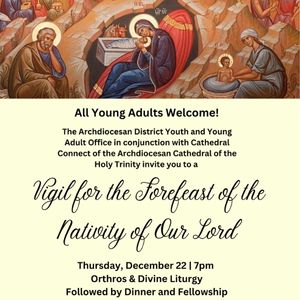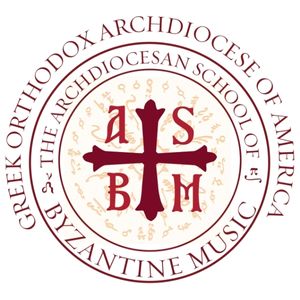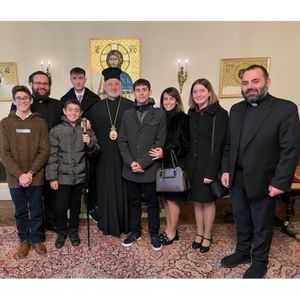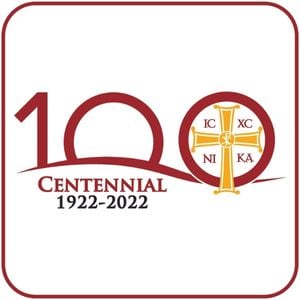Saint Barbara News
12/04/2022
Sunday, December 4 - Βαρβάρα Μεγαλομάρτυς και Ιωάννης ο Δαμασκηνός
Feast Day of Saint Barbara the Great Martyr and John the Righteous of Damascus
10th Sunday of Luke - Κυριακή Ι’ Λουκά
Οrthros - Ορθρος... 8:30 a.m.
Divine Liturgy - Θεία Λειτουργία... 9:45 a.m.
Sunday School - Κατηχητικό Σχολείο ... 9:45 a.m.
Coffee Fellowship following the Divine Liturgy
Saint Barbara Varsity Basketball vs. Holy Trinity (NR) at Holy Trinity, Bridgeport ... 1:00 p.m.
Monday, December 5
Athletics Practice - Προπόνηση Αθλητικών -
Volleyball - CT Sports Center, Woodbridge ... 7:30 p.m.
Varsity Basketball - CT Sports Center, Woodbridge ... 7:30 p.m.
Tuesday, December 6 - Saint Nicholas the Wonderworker - Νικολάου του Θαυματουργού
Οrthros - Ορθρος... 9:00 a.m.
Divine Liturgy - Θεία Λειτουργία... 10:00 a.m.
Wednesday, December 7
Philoptochos Society Meeting - Grand Ballroom - Συνεδρίασις Φιλοπτώχου ... 7:00 p.m.
A.H.E.P.A. Meeting - Συνεδράσις Α.Χ.Ε.Π.Α. ... 7:00 p.m.
Thursday, December 8
Greek Language School - Ελληνικό Σχολείο .... 4:30 p.m.
Greek Language School Pageant Practice - Grand Ballroom ... 5:00 - 7:00 p.m.
Friday, December 9
G.O.Y.A. Dance - Holy Trinity, New Rochelle, NY ... 7:30 - 11:30 p.m.
Sunday, December 11
11th Sunday of Luke - Κυριακή ΙA’ Λουκά
Οrthros - Ορθρος... 8:30 a.m.
Divine Liturgy - Θεία Λειτουργία... 9:45 a.m.
Sunday School - Κατηχητικό Σχολείο ... 9:45 a.m.
Sunday School - Christmas Pageant Rehearsal ... 11:15 a.m.
G.O.Y.A. Meeting - Συνεδρίασις ΓΚΟΓΙΑ ... 12:15 p.m.
P.A.T.C.H.E.S./J.O.Y. - Decorating Gingerbread Houses ... 12:15 p.m.
Coffee Fellowship following the Divine Liturgy
Memorials:
12/04/2022
Stewardship 2022
12/04/2022
Financial Update
12/04/2022
Saint Barbara General Fund
2022 Financial Summary
Total Annual Budget: $718,000*
Total Income: $643,326
Total Expense: $674,147
* Does not include mortgage payment of $19,053 a month
Light A Candle Program
“LIGHT A CANDLE” PROGRAM
As we continue to follow precautions and guidelines that due to COVID-19 you are invited to participate in the Candle Lighting Ministry.
Many parishioners have been expressing a desire to have candles lit inside the Church for them, or for their family, friends or prayers for the world.
If you prefer to mail a check, instead of making an online donation or Venmo, please make check payable to: Saint Barbara Greek Orthodox Church and mail to: 480 Racebrook Road, Orange, CT 06477.
Your donation will continue to support the ministry of the Saint Barbara Greek Orthodox Church of Orange, Connecticut. Thank you.
Online Giving Reminder
Saint Barbara Church’s online giving program makes it possible to make contributions of various kinds to Saint Barbara Church online. Our secure system allows you to conveniently make donations online. You can choose to make a one-time contribution or establish a recurring weekly or monthly contribution. Best of all, you don’t need to remember to write a check or bring your offering to church - it’s already taken care of! Payments can be made via checking account, savings account, credit card or debit card. Visit (https://bit.ly/STBDonations) to get started.










 All Young Adults are welcome to participate in a Vigil for the fore feast for the Nativity of our Lord.
All Young Adults are welcome to participate in a Vigil for the fore feast for the Nativity of our Lord.
 The Greek Orthodox Archdiocese of America is pleased to announce the official reopening of the Archdiocesan School of Byzantine Music (ASBM) and the beginning of online registration for the 2022 new year.
The Greek Orthodox Archdiocese of America is pleased to announce the official reopening of the Archdiocesan School of Byzantine Music (ASBM) and the beginning of online registration for the 2022 new year.
 Rev. Protopresbyter Georgios Oikonomou received the blessing of His Eminence Archbishop Elpidophoros of America upon his assignment as Proistamenos of St. Nicholas Church in Baltimore, MD beginning December 1, 2022.
Rev. Protopresbyter Georgios Oikonomou received the blessing of His Eminence Archbishop Elpidophoros of America upon his assignment as Proistamenos of St. Nicholas Church in Baltimore, MD beginning December 1, 2022.
 Dear Reverend Clergy, Parish Council Members, and Parishioners,
As we continue on our journey towards the Birth of Our Savior, it brings me great joy to invite you all, on behalf of His Eminence Archbishop Elpidophoros of America, to our Christmas Open House on Wednesday, December 21, 2022, at our Holy Archdiocese of America Headquarters.
Dear Reverend Clergy, Parish Council Members, and Parishioners,
As we continue on our journey towards the Birth of Our Savior, it brings me great joy to invite you all, on behalf of His Eminence Archbishop Elpidophoros of America, to our Christmas Open House on Wednesday, December 21, 2022, at our Holy Archdiocese of America Headquarters.